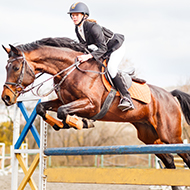Ethical framework for equine sport revealed

"We hope this framework will be a pivotal step forward" - Roly Owers, World Horse Welfare.
An 'Ethical Framework for the Use of Horses in Sport' was unveiled at an industry workshop, where over 90 leaders from equine sport, the veterinary profession, academia and the media contributed their ideas on the topic of ethical issues.
Developed by the Royal Veterinary College (RVC), in collaboration with World Horse Welfare, the framework has been designed to deliver an agreed and transparent method of approaching ethical issues across equestrian disciplines.
Attended by representatives from across horse sport disciplines, the workshop explore ethical issues across each discipline, and considered how the framework could be most usefully applied to address them.
Ethical challenges identified in the workshop included fatalities and catastrophic injuries, care and management of equine athletes throughout their life, rider/driver weight and competence, and the use of equipment such as whips, spurs, bitted bridles and nosebands.
Roly Owers, chief executive of World Horse Welfare, said: “We hope this framework will be a pivotal step forward to help equestrian sport make decisions affecting horse welfare that are underpinned by an ethical basis.
“The next challenge is adapting this framework to become an accessible and easily applied go-to tool consistently across equine sport.
“Having a consistent, logical approach to making ethical decisions will help to make better decisions, and make it easier to communicate them to the sport and the public.”



 The veterinary mental health charity Vetlife is inviting the veterinary community to join it for a sponsored cold-water dip.
The veterinary mental health charity Vetlife is inviting the veterinary community to join it for a sponsored cold-water dip.